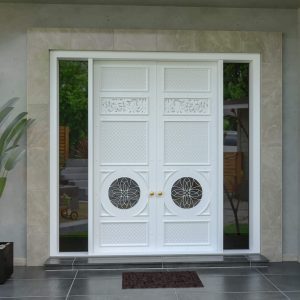Exploring Eco-Friendly Options for Exterior and Interior Doors
As awareness of environmental conservation grows, incorporating sustainable practices into our daily lives becomes increasingly important. When it comes to choosing exterior and interior doors, opting for eco-friendly materials can make a significant difference. In this article, we delve into the world of sustainable wood choices for doors, exploring the benefits of using environmentally friendly options, the various certifications to look for, and highlighting some of the top sustainable wood species available in the market today.
Benefits of Sustainable Wood Choices
Choosing sustainable wood for your doors helps protect natural resources and reduces the environmental impact associated with traditional wood harvesting practices. Sustainable wood choices promote forest conservation, maintain biodiversity, and contribute to carbon sequestration. By selecting eco-friendly materials, you are actively participating in the preservation of our planet’s precious ecosystems.
Certifications for Sustainable Wood
When purchasing wood doors, look for certifications that guarantee the wood’s sustainability. The Forest Stewardship Council (FSC) certification is one of the most recognized and respected standards for sustainable forestry. It ensures that the wood is sourced from responsibly managed forests, considering ecological, social, and economic factors. Additionally, other certifications like the Programme for the Endorsement of Forest Certification (PEFC) and the Sustainable Forestry Initiative (SFI) offer similar assurances of sustainable wood sourcing.
Sustainable Wood Species for Exterior Doors
Several sustainable wood species are suitable for exterior doors, providing durability and resistance to weather conditions. Cedar, known for its natural resistance to decay and insects, is a popular choice. Another option is Accoya wood, which undergoes a non-toxic modification process, increasing its dimensional stability and durability. Bamboo, though not a wood species but a fast-growing grass, is also an eco-friendly alternative for exterior doors due to its rapid renewable nature.
Sustainable Wood Species for Interior Doors
When it comes to interior doors, a wide range of sustainable wood species is available. Oak, a slow-growing hardwood, is often harvested sustainably and is prized for its strength and beauty. Walnut is another excellent choice, known for its rich colors and grain patterns. Additionally, reclaimed wood, salvaged from old structures or repurposed materials, provides a sustainable option that adds character and history to interior spaces.
Finishes and Treatments
To further enhance the sustainability of wood doors, consider environmentally friendly finishes and treatments. Look for low-VOC (volatile organic compound) or zero-VOC paints, stains, and sealants that minimize off-gassing and reduce harmful chemical emissions. Water-based finishes are also a sustainable alternative to solvent-based ones. These choices ensure a healthier indoor environment while maintaining the natural beauty of the wood.
Making sustainable wood choices for exterior and interior doors is a meaningful step towards promoting environmental stewardship in your home. By selecting wood species certified by reputable organizations like FSC, you can ensure that your doors are sourced responsibly and contribute to forest conservation. Consider sustainable wood options such as cedar, Accoya, bamboo, oak, walnut, and reclaimed wood. Additionally, opt for eco-friendly finishes and treatments to further enhance the sustainability of your doors. By embracing sustainable practices, you not only enjoy the beauty and functionality of wood doors but also play a role in preserving our planet for future generations.










